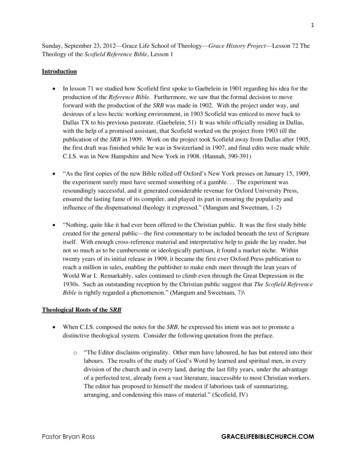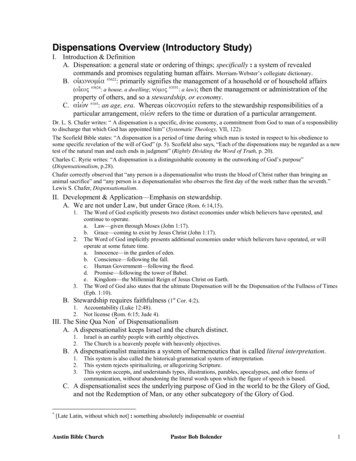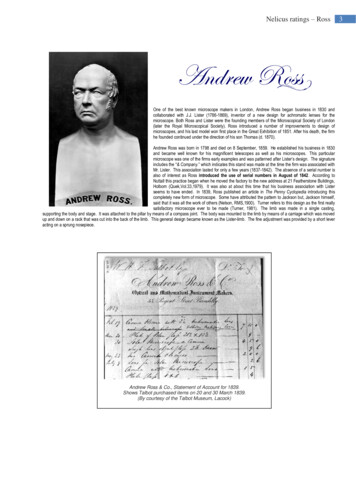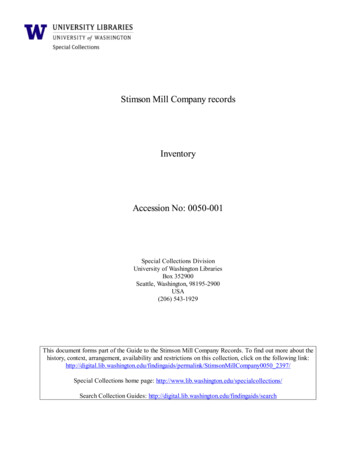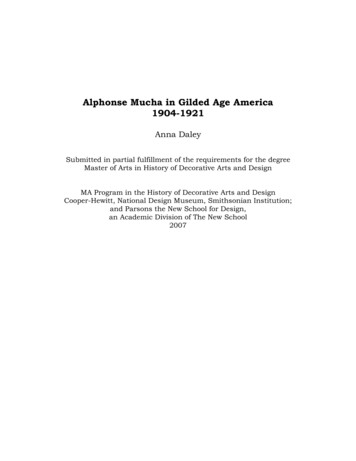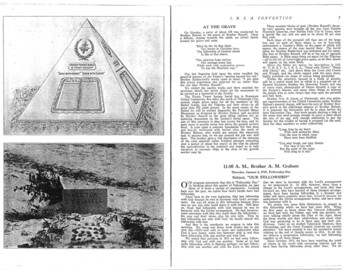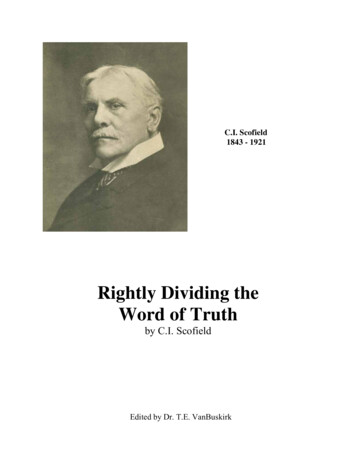
Transcription
C.I. Scofield1843 - 1921Rightly Dividing theWord of Truthby C.I. ScofieldEdited by Dr. T.E. VanBuskirk
Instructions for study for Hermeneutics I.HERMENEUTICS I.Course is worth 1.5 credits.Textbook is Rightly Dividing the Word of Truth by Dr. C.I. Scofield.Attendance:- Minimum attendance for the complete Hermeneutics I. section is 10 weeks.- Minimum attendance for each lesson in this section is 1 week.Scriptures referenced in the textbook:Student is required to look up in their KJV, every scripture reference in this and allcourses. This includes any scriptures wholly or partially quoted in the textbook.In this course, if the scripture is quoted or referred to in the textbook and the actualreference is not given, then the student is required to find the scripture. This can bedone through the use of a concordance or Bible search program such as therecommended free program, e-sword, that is listed on the study helps page of thewebsite. The link to the study helps is in the left-hand Nav bar of those pages thathave that bar.Suggested studies:There are some suggested studies listed in the textbook. Although they are notrequired, each student is strongly encouraged to carry out those suggested studies.They will clarify some parts of the textbook by Scofield and help rectify someproblem stands taken by him on several subjects. The studies are only for the benefitof the student’s personal growth in The Word and are not to be turned in to thecollege for grading.Ed. Note:From time to time there will be Editor’s Notes in the textbook. These generally arethere to correct some incorrect or easily misunderstood statements in the textbook.They will be plainly marked to differentiate them from Dr. Scofield’s text.Dr. T.E. VanBuskirk
RIGHTLY DIVIDINGTHE WORD OF TRUTH(2 TIMOTHY 2:15)BEINGTEN OUTLINE STUDIESOF THE MOREIMPORTANT DIVISIONS OF THE SCRIPTURE[SCANNED AND CONVERTED TO HTML ON 04/04/01]By Dr. C.I. SCOFIELDCONTENTSINTRODUCTION. .Page.I. THE JEW, THE GENTILE, AND THE CHURCH OF GOD .7II. THE SEVEN DISPENSATIONS.18III. THE TWO ADVENTS.IV. THE TWO RESURRECTIONS.24.38V. THE FIVE JUDGMENTS.42VI. LAW AND GRACE.50.VII. THE BELIEVER'S TWO NATURES.VIII. THE BELIEVER'S STANDING AND STATE.IX. SALVATION AND REWARDS.X. BELIEVERS AND PROFESSORS. .66.758590
LESSON ONERIGHTLY DIVIDINGTHE WORD OF TRUTHINTRODUCTIONIN the second chapter of Second Timothy the believer is presented in seven characters. Heis called a son, ver. 1; a soldier, ver. 3; an athlete, ver. 5; a husbandman, ver. 6; a workman, ver.15; a vessel, ver. 21; and a servant, ver. 24.With each of these characters there is a suited exhortation. As a son, Timothy is exhorted tobe strong in grace. Grace goes with sonship, just as law goes with servitude—as we learn fromGalatians. Then, as a soldier, Timothy is exhorted to endure hardness, and to avoid worldlyentanglements; these are right elements of good soldiership. As a vessel, he is to be cleansed,separated; as a servant, gentle, patient, meek, and so of each of these seven aspects of his life as aChristian.In verse 15 he is told what is required of him as a workman: "Study to shew thyselfapproved unto God, a workman that needed not to be ashamed, rightly dividing the Word ofTruth."The Word of Truth, then, has right divisions, and it must be evident that, as one cannot be "aworkman that needed not to be ashamed " without observing them, so any study of that Wordwhich ignores those divisions must be in large measure profitless and confusing. ManyChristians freely confess that they find the study of the Bible weary work. More find it so, whoare ashamed to make the confession.The purpose of this pamphlet is to indicate the more important divisions of the Word ofTruth. That this could not be fully done short of a complete analysis of the Bible is, of course,evident; but it is believed that enough is given to enable the diligent student to perceive thegreater outlines of truth, and something of the ordered beauty and symmetry of that Word of Godwhich, to the natural mind, seems a mere confusion of inharmonious and conflicting ideas.The student is earnestly exhorted not to receive a single doctrine upon the authority of thisbook, but, like the noble Bereans (Acts 17: 11), to search the Scriptures daily whether thesethings are so. No appeal is made to human authority. "The anointing which ye have received ofHIM abideth in you, and ye need not that any MAN teach you" (1 John 2: 27).Return to Contentsp. 1
THE JEW, THE GENTILE, AND THE CHURCH OF GODKEY TEXT: "Give none offence, neither to the Jews, nor to the Gentiles, nor to the church of God” (I Cor. 10: 32).WHOEVER reads the Bible with any attention cannot fail to perceive that more than halfof its contents relate to one nation—the Israelites. He perceives, too, that they have a verydistinct place in the dealings and counsels of God. Separated from the mass of mankind, they aretaken into covenant with Jehovah, who gives them specific promises not given to any othernation. Their history alone is told in Old Testament narrative and prophecy—other nations beingmentioned only as they touch the Jew. It appears, also, that all the communications of Jehovah toIsrael as a nation relate to the Earth. If faithful and obedient, the nation is promised earthlygreatness, riches and power; if unfaithful and disobedient, it is to be scattered "among all people,from the one end of the earth even to the other " (Deut. 28: 64). Even the promise of the Messiahis of blessing to "all the families of the Earth.”Continuing his researches, the student finds large mention in Scripture of another distinctbody, which is called the Church. This body also has a peculiar relation to God, and, like Israel,has received from Him specific promises. But similarity ends there, and the most strikingcontrast begins. Instead of being formed of the natural descendants of Abraham alone, it is abody in which the distinction of Jew and Gentile is lost. Instead of the relation being one of merecovenant, it is one of birth. Instead of obedience bringing the reward of earthly greatness andwealth, the Church is taught to be content with food and raiment, and to expect persecution andhatred, and it is perceived that just as distinctly as Israel stands connected with temporal andearthly things, so distinctly does the Church stand connected with spiritual and heavenly things.Further, Scripture shows him that neither Israel nor the Church always existed. Each had arecorded beginning. That of Israel he finds in the call of Abram. Looking then for the birth ofthe Church he finds (contrary, perhaps, to his expectations, for he has probably been taught thatAdam and the Patriarchs are in the Church) that it certainly did not exist before, nor during, theearth-life of Christ, for he finds Him speaking of His Church as yet future when He says (Matt.16: 18), Upon this rock I WILL build my Church."Not have built, nor am building," but “WILL build."He finds, too, from Eph. 3: 5-10, that the Church is not once mentioned in Old Testamentprophecy, but was, in those ages, a mystery "hid in God." Scripturally, he finds the birth of theChurch in Acts 2, and the termination of its career on the earth in 1 Thess. 4.The student also finds, in the scriptural division of the race, another class, rarely mentioned,and distinguished in every respect from either Israel or the Church—the Gentiles. Thecomparative position of the Jew, the Gentile, and the Church may be briefly seen in the followingscriptures:The JewRom. 9:4, 5John 4:22Rom. 3:1, 2The GentileEph. 2:11, 12Eph 4:17, 18Mark 7:27, 28The ChurchEph. 1:22, 23Eph. 5:29-331 Pet. 2:9See Ed. Note on next page.p. 2
Ed. Note:Obviously Dr. Scofield was of the school of thought that The Church built by Jesus Christ cameinto existence on the day of Pentecost, which he, Scofield, considers the “birth” day of the Church.Dr. Scofield, like many others, mixes up empowerment with establishment. Christ establishedHis Church while here on the earth. Then in Acts ch. 2, referred to by Scofield as the recounting ofthe “birth” of the Church, the already existent Church was empowered.That this is the story of the empowering of the Church can easily be seen if one simply goes backto the promise given by Christ to His Church in Acts 1:4-8.Act 1:4 And, being assembled together with them, commanded them that they shouldnot depart from Jerusalem, but wait for the promise of the Father, which, saith he, yehave heard of me.Act 1:5 For John truly baptized with water; but ye shall be baptized with the HolyGhost not many days hence.Act 1:6 When they therefore were come together, they asked of him, saying, Lord, wiltthou at this time restore again the kingdom to Israel?Act 1:7 And he said unto them, It is not for you to know the times or the seasons, whichthe Father hath put in his own power.Act 1:8 But ye shall receive power, after that the Holy Ghost is come upon you: and yeshall be witnesses unto me both in Jerusalem, and in all Judaea, and in Samaria, andunto the uttermost part of the earth. (Underline added for emphasis.)At Pentecost this promise was fulfilled. In order to receive power at Pentecost the Church hadto exist. They were promised power, not existence, and you cannot empower something that doesnot already exist. Therefore, the Church must have already existed and was then empowered aspromised. Obviously the establishment of it must have been at some time prior to Pentecost. Whichwould put it’s establishment, contrary to Dr. Scofield’s statement, during the ministry of Christ onthe earth.For a more complete exposition of this subject see the First Year required course on The Church.Dr. T.E. VanBuskirk
JEW, GENTILE, AND CHURCH OF GODComparing, then, what is said in Scripture concerning Israel and the Church, he finds that inorigin, calling, promise, worship, principles of conduct, and future destiny—all is contrast.CALLINGIsrael.Church.Now the LORD had said unto Abram, Getthee out of thy country, and from thy kindred,and from thy father's house, unto a land that Iwill shew thee (Gen. 12:1).Wherefore, holy brethren, partakers of theheavenly calling (Heb 3:1).For our conversation [citizenship] is inheaven; from whence also we look for theSaviour, the Lord Jesus Christ: (Phil 3:20).For the LORD thy God bringeth thee into agood land, a land of brooks of water, offountains and depths that spring out of valleysand hills; A land of wheat, and barley, andvines, and fig trees, and pomegranates; a landof oil olive, and honey; A land wherein thoushalt eat bread without scarceness, thou shaltnot lack any thing in it; a land whose stonesare iron, and out of whose hills thou mayestdig brass. Deut 8:7-9And he said, I am Abraham's servant. Andthe LORD hath blessed my master greatly; andhe is become great: and he hath given himflocks, and herds, and silver, and gold, andmenservants, and maidservants, and camels,and asses (Gen 24:34-35).And Jesus saith unto him, The foxes haveholes, and the birds of the air have nests; butthe Son of man hath not where to lay his head.(Matt 8:20).To an inheritance incorruptible, andundefiled, and that fadeth not away, reservedin heaven for you (1 Pet. 1:4)Even unto this present hour we both hunger,and thirst, and are naked, and are buffeted, andhave no certain dwelling place; (1 Cor. 4:11)And Jesus looked round about, and saithunto his disciples, How hardly shall they thathave riches enter into the kingdom of God!(Mark 10:23)Hearken, my beloved brethren, Hath notGod chosen the poor of this world rich infaith, and heirs of the kingdom which he hathpromised to them that love him? (James 2:5)They shall put you out of the synagogues:yea, the time cometh, that whosoever killethyou will think that he doeth God service. (John16:2).The LORD shall cause thine enemies thatrise up against thee to be smitten before thyface: they shall come out against thee one way,and flee before thee seven ways. (Deut. 28:7)And the LORD shall make thee the head,and not the tail; and thou shalt be above only,and thou shalt not be beneath (Deut 28:13)Whosoever therefore shall humble himselfas this little child, the same is greatest in thekingdom of heaven. (Matt 18:4)Of course it is not meant that a godly Jew did not, at death, go to heaven. The distinction isthat the incentive to godliness in his case was earthly blessings, not heavenly. It should beneedless to say that, in this dispensation, neither Jew nor Gentile can be saved otherwise than bythe exercise of that faith on the Lord Jesus Christ whereby both are born again (John 3: 3,16) andare baptized into that " one body " (1 Cor. 12: 13) which is " the Church" (Eph. 1: 22, 23). In theChurch the distinction of Jew and Gentile disappears. (1 Cor. 12: 13; Gal. 3: 28; Eph. 2: 14. Soin writing to the Ephesians the Apostle speaks of them as "in time past Gentiles, Eph. 2: 11; 1and When ye were Gentiles, 1 Cor. 12: 2).It is suggested that the student do a study of the biblical teaching on "Paradise." Afew suggested scripture references to assist in the study are: Lk 23:39-43; Eph 4:8-9;Lk 16:22-26; Job 19:25-27; I Sam 28:13-15.p. 4
JEW, GENTILE, AND CHURCH OF GODThe contrast between Israel and the Church further happens in the rules given for theconduct of each. Compare:Israel.When the LORD thy God shall bring theeinto the land whither thou goest to possess it,and hath cast out many nations before thee. . .thou shalt smite them, and utterly destroythem; thou shalt make no covenant with them,nor show mercy unto them (Deut 7:1,2)Eye for eye, tooth for tooth, hand for hand,foot for foot, Burning for burning, wound forwound, stripe for stripe. (Exodus 21:24,25)If a man have a stubborn and rebellious son,which will not obey the voice of his father, orthe voice of his mother, and that, when theyhave chastened him, will not hearken untothem: Then shall his father and his mother layhold on him, and bring him out unto the eldersof his city, and unto the gate of his place; Andthey shall say unto the elders of his city, Thisour son is stubborn and rebellious, he will notobey our voice; he is a glutton, and adrunkard. And all the men of his city shallstone him with stones, that he die: so shaltthou put evil away from among you; and allIsrael shall hear, and fear. (Deut. 21:18-21)See also,Deut 21:18-21Church.But I say unto you, Love your enemies, blessthem that curse you, do good to them that hateyou, and pray for them which despitefully useyou, and persecute you (Matt 5:44).Being reviled, we bless; being persecuted,we suffer it: Being defamed, we intreat (1 Cor4:12,13).But I say unto you, That ye resist not evil:but whosoever shall smite thee on thy rightcheek, turn to him the other also. (Matt 5:39)And he arose, and came to his father. Butwhen he was yet a great way off, his fathersaw him, and had compassion, and ran, andfell on his neck, and kissed him. And the sonsaid unto him, Father, I have sinned againstheaven, and in thy sight, and am no moreworthy to be called thy son. But the father saidto his servants, Bring forth the best robe, andput it on him; and put a ring on his hand, andshoes on his feet: And bring hither the fattedcalf, and kill it; and let us eat, and be merry:(Luke 15:20-23)Luke 15: 20-23In the appointments for worship we still find contrast. Israel could worship in but one place,and at a distance from God—only approaching Him through a priest. The Church worshipswherever two or three are gathered, has boldness to enter into the holiest, and is composed ofpriests. Compare:Lev. 17: 8,9Luke 1:10Num. 8: 10withwithwithMatt. 18:20Heb. 10: 19,201 Pet 2: 5In the predictions concerning the future of Israel and the Church, the distinction is still morestartling. The Church will be taken away from the earth entirely, but restored Israel is yet to haveher greatest earthly splendor and power. See what Scripture says:p. 5
JEW, GENTILE, AND CHURCH OF GODAS TO THE CHURCHIn my Father's house are many mansions: if it were not so, I would have told you. I go toprepare a place for you. And if I go and prepare a place for you, I will come again, and receiveyou unto myself; that where I am, there ye may be also (John 14: 2, 3).For this we say unto you by the word of the Lord, that we which are alive, and remain untothe coming of the Lord, shall not prevent (precede) them which are asleep. For the Lord himselfshall descend from heaven with a shout, with the voice of the archangel, and with the trump ofGod: and the dead in Christ shall rise first: then we which are alive and remain shall be caught uptogether with them in the clouds, to meet the Lord in the air: and so shall we ever be with theLord (1 Thess. 4:15-17).For our conversation is in heaven; from whence also we look for the Saviour, the Lord JesusChrist: Who shall change our vile body, that it may be fashioned like unto his glorious body (Phil3:20, 21).Beloved, now are we the sons of God; and it doth not yet appear what we shall be: but weknow that, when he shall appear, we shall be like him; for we shall see him as he is (1 John 3: 2).Let us be glad and rejoice, and give honour to him: for the marriage of the Lamb is come,and his wife hath made herself ready. And to her was granted that she should be arrayed in finelinen, clean and white: for the fine linen is the righteousness of saints. And he saith unto me,Write, Blessed are they which are called unto the marriage supper of the Lamb (Rev 19:7-9).Blessed and holy is he that hath part in the first resurrection: on such the second death hathno power, but they shall be priests of God and of Christ, and shall reign with him a thousandyears (Rev 20:6).AS TO ISRAELAnd, behold, thou shalt conceive in thy womb, and bring forth a son, and shalt call his nameJESUS. He shall be great, and shall be called the Son of the Highest: and the Lord God shall giveunto him the throne of his father David: And he shall reign over the house of Jacob for ever; andof his kingdom there shall be no end (Luke 1:31-33).(Of these seven promises to Mary, five have already been literally fulfilled. By what rule ofinterpretation are we authorized to say the remaining two will not be fulfilled?)Simeon hath declared how God at the first did visit the Gentiles, to take out of them a peoplefor his name. And to this agree the words of the prophets; as it is written, After this I WILLRETURN, and will build again the tabernacle of David, which is fallen down; and I will buildagain the ruins thereof, and I will set it up (Acts 15:14-16).I say then, Hath God cast away his people? God forbid. For I also am an Israelite, of the seedof Abraham, of the tribe of Benjamin. I say then, Have they stumbled that they should fall? Godforbid: but rather through their fall salvation is come unto the Gentiles, for to provoke them tojealousy. For if thou wert cut out of the olive tree which is wild by nature, and wert graffedcontrary to nature into a good olive tree: how much more shall these, which be the naturalbranches, be graffed into their own olive tree? For I would not, brethren, that ye should beignorant of this mystery, lest ye should be wise in your own conceits; that blindness in part ishappened to Israel, until the fulness of the Gentiles be come in. AND SO ALL ISRAEL SHALL BESAVED: as it is written, There shall come out of Sion the Deliverer, and shall turn awayungodliness from Jacob (Rom 11:1, 11, 24-26).p. 6
JEW, GENTILE, AND CHURCH OF GODAnd it shall come to pass in that day, that the Lord shall set his hand again the second timeto recover the remnant of his people . . . And he shall set up an ensign for the nations, and shallassemble the outcasts of Israel, and gather together the dispersed of Judah from the four cornersof the earth (Isa. 11:11-12).For the LORD will have mercy on Jacob, and will yet choose Israel, and set them in theirown land: and the strangers shall be joined with them, and they shall cleave to the house of Jacob(Isa.14:1).Therefore, behold, the days come, saith the LORD, that it shall no more be said, The LORDliveth, that brought up the children of Israel out of the land of Egypt; But, The LORD liveth, thatbrought up the children of Israel from the land of the north, and from all the lands whither he haddriven them: and I will bring them again into their land that I gave unto their fathers (Jer. 16:1415). Behold, the days come, saith the LORD, that I will raise unto David a righteous Branch, anda King shall reign and prosper, and shall execute judgment and justice in the earth. In his daysJudah shall be saved, and Israel shall dwell safely: and this is his name whereby he shall becalled, THE LORD OUR RIGHTEOUSNESS (Jer. 23:5-6).Behold, I will gather them out of all countries, whither I have driven them in mine anger,and in my fury, and in great wrath; and I will bring them again unto this place, and I will causethem to dwell safely: And they shall be my people, and I will be their God (Jer. 32:37-38).Sing, O daughter of Zion; shout, O Israel; be glad and rejoice with all the heart, O daughterof Jerusalem. The LORD hath taken away thy judgments, he hath cast out thine enemy: the kingof Israel, even the LORD, is in the midst of thee: thou shalt not see evil any more (Zeph. 3:1415).It may safely be said that the Judaizing of the Church has done more to hinder her progress,pervert her mission, and destroy her spirituality, than all other causes combined. Instead ofpursuing her appointed path of separation from the world and following the Lord in her heavenlycalling, she has used Jewish Scriptures to justify herself in lowering her purpose to thecivilization of the world, the acquisition of wealth, the use of an imposing ritual, the erection ofmagnificent churches, the invocation of God's blessing upon the conflicts of armies, and thedivision of an equal brotherhood into "clergy" and " laity."Return to ContentsEnd of Lesson OneCLICK FOR TESTp. 7
LESSON TWOTHE SEVEN DISPENSATIONSTHE Scriptures divide time (by which is meant the entire period from the creation ofAdam to the "new heaven and a new earth" of Rev. 21: 1) into seven unequal periods, usuallycalled "Dispensations" (Eph. 3: 2), although these periods are also called " ages " (Eph. 2: 7) and" days–as, " day of the Lord," etc.These periods are marked off in Scripture by some change in God's method of dealing withmankind, or a portion of mankind, in respect of the two questions: of sin, and of man'sresponsibility. Each of the dispensations may be regarded as a new test of the natural man, andeach ends in judgment–marking his utter failure in every dispensation.Five of these dispensations, or periods of time, have been fulfilled; we are living in the sixth,probably toward its close, and have before us the seventh, and last–the millennium.1. MAN INNOCENT.—This dispensation extends from the creation of Adam, Gen. 2: 7, tothe expulsion from Eden. Adam, created innocent, and ignorant of good and evil, was placed inthe garden of Eden with his wife, Eve, and put under responsibility to abstain from the fruit ofthe tree of the knowledge of good and evil. The Dispensation of Innocence resulted in the firstfailure of man, and in its far reaching effects, the most disastrous. It closed in judgment—" SoHe drove out the man." See,Gen 1:26Gen 2:16-17Gen 3:6Gen 3:22-242. MAN UNDER CONSCIENCE. — By the Fall, Adam and Eve acquired, and transmittedto the race, the knowledge of good and evil. This gave conscience a basis for right moraljudgment, and hence the race came under this measure of responsibility—to do good and eschewevil. The result of the Dispensation of Conscience, from Eden to the Flood (while there was noinstitution of government and of law), was that " all flesh had corrupted his way on the earth; "that "the wickedness of man was great in the earth, and that every imagination of the thoughts ofhis heart was only evil continually; " and God closed the second testing of the natural man withjudgment—the Flood. See,Gen. 3:7,22Gen.6:5,11,12Gen.7:11,12,233. MAN IN AUTHORITY OVER THE EARTH.—Out of the fearful judgment of the FloodGod saved eight persons, to whom, after the waters were assuaged, He gave the purified earthwith ample power to govern it. This, Noah and his descendants were responsible to do. TheDispensation of Human Government resulted, upon the plain of Shinar, in the impious attempt tobecome independent of God and closed in judgment—the Confusion of Tongues. See,Gen. 9: 1, 2Gen. 11: 1-4Gen. 11: 5-8p. 8
THE SEVEN DISPENSATIONS4. MAN UNDER PROMISE.—Out of the dispersed descendants of the builders of Babel,God now calls one man, Abram, with whom He enters into covenant. Some of the promises toAbram and his descendants were purely gracious and unconditional. These either have been, orwill yet be, literally fulfilled. Other promises were conditional upon the faithfulness andobedience of the Israelites. Every one of these conditions was violated, and the Dispensation ofPromise resulted in the failure of Israel's family and closed in the judgment of Bondage in Egypt.The book of Genesis, which opens with the sublime words, "In the beginning God created,"closes with, " In a coffin in Egypt."Gen. 12: 1-3Gen. 15: 5Gen. 26: 3Gen. 28; 12, 13Gen. 13: 14-17Ex. 1: 13, 145. MAN UNDER LAW.—Again the grace of God came to the help of headless man andredeemed the chosen people out of the hand of the oppressor. In the wilderness of Sinai Heproposed to them the Covenant of Law. Instead of humbly pleading for a continued relation ofgrace, they presumptuously answered: "All that the Lord hath spoken we will do." The history ofIsrael in the wilderness and in the Land is one long record of flagrant, persistent violation of theLaw, and at last, after multiplied warnings, God closed the testing of man by Law in judgment:first Israel, and then Judah, were driven out of the Land into a dispersion which still continues. Afeeble remnant returned under Ezra and Nehemiah, of which, in due time, Christ came: " Born ofa woman—made under the law." Him both Jews and Gentiles conspired to crucify. See,Exod. 19:1-8Rom. 10: 5Gal 3:10Rom. 3: 19, 202 Kings 17: 1-18Acts 2:22-23Acts 7:512 Kings 25:1-116. MAN UNDER GRACE.—The sacrificial death of the Lord Jesus Christ introduced thedispensation of pure grace—which means undeserved favor, or God GIVING righteousness,instead of God REQUIRING righteousness, as under Law.Salvation, perfect and eternal, is now freely offered to Jew and Gentile upon theacknowledgment of sin, or repentance, with faith in Christ.Jesus answered and said unto them, This is the work of God, that ye BELIEVE on Him whomhe hath sent (John 6: 29).Verily, verily, I say unto you, He that BELIEVETH on Me HATH everlasting life (John 6: 47).Verily, verily, I say unto you, He that heareth my word, and BELIEVETH onHim that sent me,HATH everlasting life, and shall not come into condemnation; but is passed from death unto life(John 5:24).My sheep hear my voice, and I know them, and they follow Me: and I give unto them eternallife; and they shall never perish (John 10: 27, 28).For by grace are ye saved through faith; and that not of yourselves: it is the gift of God: Notof works, lest any man should boast (Eph 2:8-9).The predicted result of this testing of man under grace is judgment upon an unbelievingworld and an apostate Church.Luke 18: 8Luke 17:26-30p. 9
THE SEVEN DISPENSATIONSRev. 3: 15, 162 Thess. 2:7-12The first event in the closing of this dispensation will be the descent of the Lord fromheaven, when sleeping saints will be raised and, together with believers then living, caught up "tomeet the Lord in the air: and so shall we ever be with the Lord " (1 Thess. 4: 16,17).Then follows the brief period called " the great tribulation."Matt. 24: 21, 22Zeph.1: 15-18Dan. 12: 1Jer.30:5-7After this occurs the personal return of the Lord to the earth in power and great glory, andthe judgments which introduce the seventh, and last dispensation.Matt. 24:29, 30Matt. 25:31-467. MAN UNDER THE PERSONAL REIGN OF CHRIST.—After the purifyingjudgments which attend the personal return of Christ to the earth, He will reign over restoredIsrael and over the earth for one thousand years. This is the period commonly called theMillennium. The seat of His power will be Jerusalem, and the saints, including the saved of theDispensation of Grace, viz., the Church, will be associated with Him in His glory. See,Acts 15:14-17Isa. 2:1-4Rev. 19:11-21Rev. 20:1-6Isa. 11-the entire chapter.But when Satan is "loosed a little season," he finds the natural heart as prone to evil asever, and easily gathers the nations to battle against the Lord and His saints, and this lastdispensation closes, like all the others, in judgment. The “great white throne" is set, the wickeddead are raised and finally judged, and then come the “new heaven and a new earth"—eternity isbegun.Rev. 20: 3,7-15Rev. chaps. 21 and 22Return to ContentsEnd of Lesson TwoCLICK FOR TESTp. 10
LESSON THREETHE TWO ADVENTSKEY TEXT . . ."When it testified beforehand the sufferings of Christ, and the glory that should follow” (1 Pet. 1: 11).WHOEVER carefully considers Old Testament prophecies must be struck by twocontrasting, and seemingly contradictory, lines of prediction concerning the coming Messiah.One body of prediction speaks of Him as coming in weakness and humiliation, a man of sorrowsand acquainted with grief, as a root out of dry ground, having no form nor comeliness, nor beautythat He should be desired. His visage is to be marred, His hands and feet pierced, He is to beforsaken of man and of God, and to make His grave with the wicked. See,Isa. (entire chapter)Isa 7: 14Ps 22: 1-18Dan 9:26Zech 13: 6,7Mark 14: 27The other line of prophecy foretells a splendid and resistless Sovereign, purging the earthwith awful judgments, regathering dispersed Israel, restoring the
Obviously Dr. Scofield was of the school of thought that The Church built by Jesus Christ came into existence on the day of Pentecost, which he, Scofield, considers the "birth" day of the Church. Dr. Scofield, like many others, mixes up empowerment with establishment. Christ established His Church while here on the earth.


